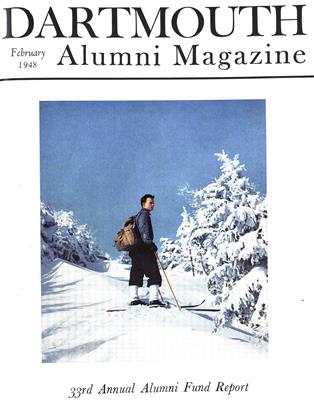by Richard. Eberhart '26.Oxford University Press, 1947; viii 68; $3.00.
Among living graduates of Dartmouth who practice poetry, Eberhart is so far certainly the most distinguished, although he has probably received more recognition in England than in America. In this, his fourth book of new poems, he continues the blend of the seventeenth-century metaphysical and the twentieth-century informal idiom that characterized the best pieces in his earlier books. Philosophical lyrics of two pages or less have been grouped as Section I; four longer pieces compose Section II: and shorter poems evoked by World War II make up the concluding section.
In the longest poem, "Triptych," a conversation poem between Percy, intended to represent the exhilaratingly iconoclastic poet, and John, who obviously is a pretty square-toed scholar, Eberhart is to my taste at his least successful. My sympathies lie entirely with John, who can hardly interpolate a word in the stream o£ Percy's sel£-adulation. Another of the longer pieces, "Ode to the Chinese Paper Snake," is a stimulating symbolic presentation of those modes of thought and action most of us think of as in some way particularly "Oriental." And the longish sequence which gives the book its title is an attractive evocation of diverse attitudes toward existence from scenes recollected from youth.
But on the whole, it is in the shorter poems that Eberhart achieves his greatest successes. Such war poems as "Dam Neck, Virginia," "The Fury of Aerial Bombardment," and "An Airman Considers His Power" integrate passion with intellect—too seldom an ingredient in poems on this theme. And in some poems in the opening section, Eberhart has memorably wrestled with death, and with the reality which lies beyond and beneath our experience. In particular, nobody should miss the tightly sardonic "New Hampshire, February."
 View Full Issue
View Full Issue
More From This Issue
-
 Article
ArticleATOMIC ENERGY CONTROL
February 1948 By CHESTER I. BARNARD, -
 Class Notes
Class Notes1949
February 1948 -
 Class Notes
Class Notes1918
February 1948 By ERNEST H. EARLEY, DONALD L. BARR, DAVID L. GARRATT -
 Class Notes
Class Notes1935
February 1948 By H. REGINALD BANKART JR., FREDERICK T. HALEY, ROBERT W. NARAMORE -
 Class Notes
Class Notes1931
February 1948 By A. W. LAUGHTON, WILLIAM H. SCHULDENFREI, ERNEST H. MOORE -
 Class Notes
Class Notes1924
February 1948 By JAMES T. WHITE, RICHARD A. HENRY, DONALD E. COYLE
Books
-
 Books
BooksROBERT FROST, ORIGINAL "ORDINARY MAN"
APRIL 1929 By Evan A. Woodward -
 Books
BooksTHE FEMININE FIFTIES
June 1940 By Herbfrt F. West '22 -
 Books
BooksPOETS OF TODAY II.
December 1955 By Lou B. NOLL -
 Books
BooksLOGIC AND SCIENTIFIC METHODS
June 1948 By Maurice Picard -
 Books
BooksA REFERENCE GUIDE TO THE STUDY OF PUBLIC OPINION.
November 1934 By Paul Allen '26 -
 Books
BooksAMERICAN HEROINE: THE LIFE AND LEGEND OF JANE ADDAMS
October 1973 By ROBERT E. RIEGEL

